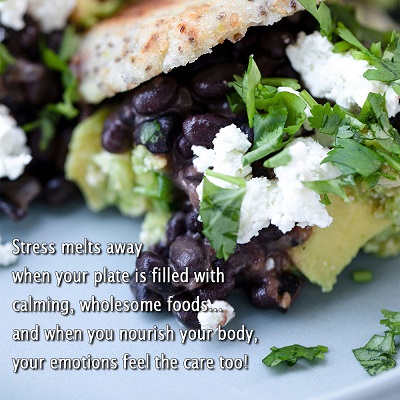 If you feel sad, do you have a favorite comfort food? Or if you feel happy, are there foods you like to buy for your personal party? If so, you can see how food can influence your emotions.
If you feel sad, do you have a favorite comfort food? Or if you feel happy, are there foods you like to buy for your personal party? If so, you can see how food can influence your emotions.
For example, you may have reached for something sweet during a stressful day or if you’ve felt tired. You know it’s not good for you, but you do anyway. However, what if you could turn this connection into a way for managing stress and promoting emotional balance? Clean eating can do that for you!
Food and Your Mind-Body Connection
Your brain and body are connected… there’s no doubt about that, but what might surprise you is how they interact in ways you may not consciously consider. One clear example is how the foods you eat directly influence your mental and emotional health.
If you struggle with stress, anxiety, or mood swings, these challenges may sometimes be worsened by nutrient deficiencies or unhealthy eating habits.
Clean eating not only supports physical health but also improves your emotional well-being. By cutting out processed foods and adding the right balance of essential nutrients, you are making positive changes that nourish both your mind and body.
How Foods Influence Your Mood
Your diet directly impacts your brain’s chemistry and your hormonal balance. You may have heard of your stress hormone, cortisol, and what it can do to your health. If not, this hormone is responsible for many of the stress symptoms that you experience, and if you are fueling it with sugary, processed foods, you will make the levels rise! What do elevated cortisol levels do?
They make you feel super stressed, and they disrupt so many functions, including your sleep, your digestion, and of course, your overall mood. If you start eating clean healthy foods, you can help to regulate your cortisol levels, which will help you feel less stressed and more calm.
Your brain relies on neurotransmitters like serotonin and dopamine to keep your mood positive. These chemicals are heavily influenced by your diet. Foods rich in certain vitamins, minerals, and amino acids help these feel-good neurotransmitters, helping to reduce your stress, and symptoms of anxiety and depression.
The Role of Essential Nutrients
When it comes to mental health, essential fatty acids, vitamins, and minerals are indispensable. Omega-3 fatty acids, found in fatty fish, walnuts, and flaxseeds, are particularly powerful. They’re known to reduce inflammation in the brain, improve cognitive function, and stabilize mood.
Vitamins like B6, B12, and folate also play key roles in reducing symptoms of stress and anxiety. These vitamins, found in foods like spinach, eggs, and whole grains, help regulate homocysteine levels, an amino acid linked to mood disorders.
Magnesium, often referred to as the ‘calming’ mineral, can help to ease anxiety and promote relaxation. It’s a great muscle relaxant too. You can find magnesium in almonds, avocados, and dark leafy greens, and natural supplements if necessary, too.
Foods That Help to Manage Emotional Balance
Clean eating eliminates many of the triggers that cause added stress, like high-sugar snacks and processed foods, that are usually filled with unhealthy additives. For example, if you eat complex carbohydrates, such as sweet potatoes and quinoa, they help to provide a steady release of energy, keeping your blood sugar levels stable and preventing mood crashes.
Probiotic-rich foods like yogurt and fermented vegetables improve gut health, which directly influences serotonin production in the gut-brain axis. When your body isn’t under the strain of sugar highs, nutrient deficiencies, or inflammatory foods, you will begin to feel so much better each and every day!
Certain foods are also known to be natural stress-busters. Leafy greens, such as kale and spinach, are packed with magnesium and folate, both of which calm the nervous system. Blueberries and other berries contain antioxidants that help combat the oxidative stress associated with anxiety and depression.
Bananas, rich in vitamin B6 and potassium, promote dopamine production, which lifts your mood. For protein, turkey and chickpeas contain tryptophan, an amino acid that your body converts into serotonin, known as your happy hormone.
As for a healthy snack, nuts or seeds are perfect to eat as your mood-stabilizing snack. Don’t forget to drink water! Hydration is so important. If you allow yourself to become dehydrated it can cause irritability and cognitive fatigue.
As you can see, what you eat can affect your mood. If you eat clean, nutrient-rich meals, you’re giving your mind and body every chance it needs to achieve better health.
Trust the process! You’ll soon discover how transformative clean eating can be for your mental and emotional well-being.






